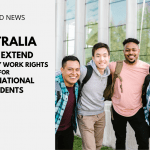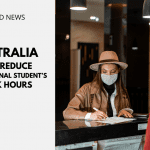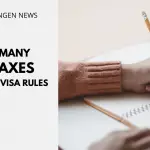Post Study Work Visa Options for International Students to think about
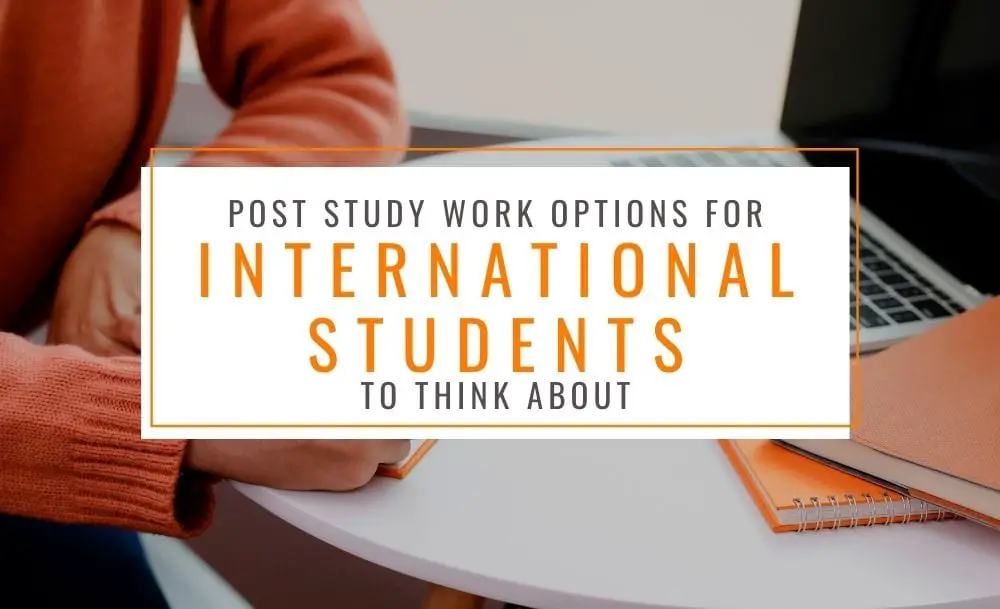 [su_spoiler title=”Contents in this Article” style=”fancy” icon=”plus-circle” anchor=”#Contents”]
[su_spoiler title=”Contents in this Article” style=”fancy” icon=”plus-circle” anchor=”#Contents”]
- Australia
- Canada
- New Zealand
- United Kingdom
- Further Studies
- Post Study Work
- Tier 2 UK Visa
- Tier 5 UK Visa
- Tier 5 Youth Mobility Scheme for UK Visa
- Tier 5 UK Visa for Temporary Worker – Religious Worker
- Tier 5 UK Visa for Temporary Worker – International Agreement
- Tier 5 UK Visa Temporary Worker – Government Authorised Exchange
- Tier 5 UK Visa Temporary Worker – Creative and Sporting
- Tier 5 UK Visa Temporary Worker – Charity Worker
- UK Innovator Visa
- United States
- Post Study Work Visas Elsewhere
When you study abroad, a question always arises for international students: What happens post-study? Why should I choose one country over another to study in? So it's important to know what are the post-study work visa options for international students.
To navigate the transition from academic studies to professional employment, understanding the nuances of post-study work visas across different nations is essential. Whether you're exploring how to convert a student visa to a work permit in Malaysia or the duration and requirements of a UK post-study work visa (now called the Graduate Route), this guide serves as a comprehensive resource.
Once you have completed your course, you have to decide whether you stay or return home. When you receive your student visa, the government lets you into your chosen country on a temporary basis of entry for study, with the understanding that you will leave upon completion of the study course, and before the visa will expire.
Considering the post study work visa processing time is crucial for planning your transition from a student visa. Each country has its own timelines and requirements, from the post study work visa eligibility in the UK to the application intricacies for a graduate visa in Australia. Preparing your documents in accordance with our post-study visa documents checklist can significantly streamline the process.
The majority of international graduates declare that their studies were a real advantage for their career and they have more potential to grow, so most of them choose to stay.
Here are the options we have gathered if you have studied in the following countries (and more below) so you can start planning the next step to reach your career goals.
But first, lets explore your options that are currently available to you if you are an International student and what your post study work visa options for International Students to think about:
Study Visas
Navigating the complexities of student visas requires a keen understanding of both the application process and the changing landscape of international education policies. It may mean that you can continue studying or you may have to leave the country. For instance, in the UK, the introduction of the Graduate Route provides an excellent opportunity for international students to stay and work for up to two years post-graduation, or three years for doctoral students. This addition highlights the UK's commitment to attracting global talent and offers a pathway from education to employment in the UK market. But this was not always the case.
Work Permits
If you are looking to work in your chosen country of study, work permits are the usual routes. Understanding the nuances of the points-based immigration system, such as the UK's Skilled Worker visa, can significantly enhance your application success rate. It's crucial to stay informed about the Shortage Occupation List, which can offer easier entry routes for professions in high demand. Tailoring your career path towards in-demand skills and ensuring compliance with the sponsoring employer's requirements are key strategies for success.
Family Reunification
If you have family where you are studying, this could also open up options for you. The process for family visas varies significantly from country to country, often involving financial requirements and proof of relationships. For example, the UK's family visa process involves meeting a minimum income threshold or showing adequate savings. You will need to keeping up to date of the latest documentation requirements and preparing for a thorough application review can mitigate delays or refusals.
Entrepreneur and Investor Visas
If you are entrepreneurial in character, or have the funds for investing in a venture, countries like the UK offer specific visa categories that cater to business innovation and investment. The UK's Innovator visa, for instance, requires a detailed business plan and an endorsement from an approved body. To jump on these routes, you should focus on demonstrating the viability and scalability of your business idea, as well as your contribution to the economy.
Visitor Visas
Visitor visas, while seemingly straightforward, can involve intricate considerations such as the purpose of the visit, financial means, and ties to the home country. Tailoring the application to clearly define the trip's intent and ensuring all documentation supports this can enhance approval chances. Awareness of visa waiver programs or e-visa options can also offer more streamlined entry routes for short-term visits and short term studies. But beware of how this may affect your current or future status in the country.
Addressing Common Challenges Across Visa Categories
One common challenge across all visa categories is the rigorous documentation and evidence required. Applicants often underestimate the level of detail needed in supporting documents, whether it's for proving financial stability, employment ties, or the genuineness of relationships. getting a document checklist and pre-application review can significantly increase the likelihood of your application approval. Additionally, understanding the appeal process for refusals and the options for legal recourse can provide a safety net for applicants facing unexpected challenges.
While the visa application process can be daunting, staying informed and prepared is key to navigating it successfully. For IaM clients, our expertise not only lies in guiding you through the application but also in providing the strategic insights and support to enhance your chances of success. Whether you're a student, a professional, or looking to reunite with family, IaM stands by your side every step of the way.
READY TO START?
START YOUR GRADUATE ROUTE VISA APPLICATION
Get help and support from our Immigration lawyers
Ready to take the next step in your international career journey? Explore detailed guides and expert advice on navigating post study work visa requirements, application processes, and more. Discover how to seamlessly transition from a student to a professional in your dream (or current) destination.
POST STUDY WORK VISA AUSTRALIA
Australia's Temporary Graduate visa (subclass 485) is split into two streams: Graduate Work and Post-Study Work. The Post-Study Work stream offers international students who have recently graduated from an Australian institution the chance to live, study, and work in Australia temporarily. The duration of stay depends on the qualification completed, with opportunities ranging up to four years for doctoral degree graduates. Applicants should pay close attention to the regional areas offering additional incentives and extensions, aligning with Australia's strategy to promote regional migration.
Further Studies
Many international students choose to complete further studies to achieve a higher qualification. Continuing your studies will enable you to gain more advanced qualifications and skillset that will assist you in gaining employment. You may study at the same institution or move to another university to expand your perspective.
Travel and Relaxation
Although you may not choose to attend another gruelling year in school there are other compelling reasons to stay in Australia. You can apply for a tourist visa to take a break and take your time exploring the country before you embark on the next phase of your life.
Post Study Work Visa options for international students in Australia
If you do decide to study in Australia, the ability to work after your studies falls into six distinct options. They are also interchangeable, but the opportunity to get work in Australia is easier than in some of the other countries we are covering.
Work and Holiday Visa (subclass 417/462)
If you are between 18 and 30 years old from the approved countries then you are eligible to apply for a Work and Holiday Visa, which grants you permission to work and travel in Australia for up to 12 months.
The approved countries are:
Argentina
Austria
Chile
China
Czech Republic
Ecuador
Greece
Hungary
Indonesia
Israel
Luxembourg
Malaysia
Peru
Poland
Portugal
San Marino
Singapore
Slovak Republic
Slovenia
Spain
Thailand
Turkey
Uruguay
USA
Vietnam
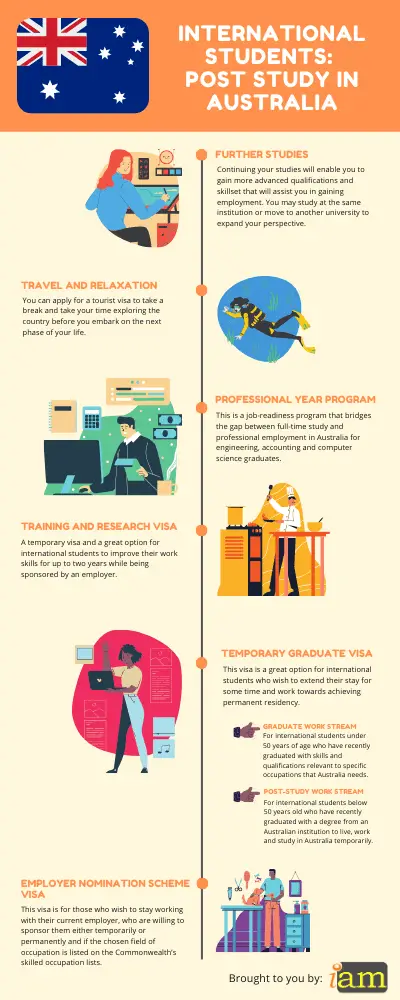
Professional Year Program
This is a job-readiness program that bridges the gap between full-time study and professional employment in Australia for engineering, accounting and computer science graduates. This is a structured 12-month program designed to help recent graduates develop industry-specific skills through study and work experience.
This program is ideal for students who want to qualify for permanent residency in Australia as successful completion of the program earns an extra five points in the skilled migrant visa points test.
Training and Research Visa (subclass 407)
A temporary visa and a great option for international students. The 407 visa is for students to improve their work skills for up to two years while being sponsored by an employer. One of the conditions for the visa is that the holder can only work if it is related to the applicant's course of study or training for 40 hours within 14 days.
Temporary Graduate Visa (subclass 485)
This visa is also a great option for international students who wish to extend their stay for quite some time and work towards achieving permanent residency. With a 485 visa, you are allowed to stay in Australia to gain work experience only if you have just completed at least two years of study in Australia. There are two streams on this visa option: Graduate Work Stream and Post-Study Work Stream:
- Graduate Work Stream
This visa is for international students under 50 years of age who have recently graduated with skills and qualifications that are relevant to specific occupations that Australia needs. It lets you live, study and work in Australia temporarily. You must have and maintain adequate health insurance for the whole of your stay in Australia. You can usually stay up to 18 months and you can bring your family with you. - Post-Study Work Stream
This visa is for international students below 50 years old who have recently graduated with a degree from an Australian institution. It lets you live, work and study in Australia, temporarily. You must have and maintain adequate health insurance for the whole of your stay in Australia. You can usually stay between 2 and 4 years, depending on your qualification.
Employer Nomination Scheme Visa (subclass 186)
If you wish to stay working with your current employer, they are willing to sponsor you either temporarily or permanently, and if your chosen field of occupation is listed on the Commonwealth’s skilled occupation lists, then you can apply for this visa. Once granted, you are able to live and work in Australia for as long as you work for that employer.
Skilled Regional (Provisional) Visa (subclass 491)
This visa provides a pathway for permanent residency for skilled workers who want to live and work in regional Australia. You must be below 45 years old with an occupation that is listed on the Commonwealth’s skilled occupation lists and you have completed the skills test. Australia uses a point system to see if someone qualifies for most visas and for a 491 visa, you should be able to score 65 points. Once you are granted a 491 visa, you can stay in Australia for five years.
Skilled Nominated Visa (subclass 190)
A permanent residency visa for people under 45 years old with occupation in high demand as listed on the Commonwealth’s skilled occupation lists. You are required to complete a skills test and be nominated by the state or territory government to apply for the visa. Australia uses a point system to see if someone qualifies for most visas and for a 190 visa, you should be able to score 65 points. Once you are granted a 190 visa, you can now sponsor eligible relatives for permanent residence.
Australia's Post Study Work Visa Options
Australia has been refining its post-study work visa options to remain attractive to international students. The Temporary Graduate Visa (subclass 485) is a standout option, divided into two streams: the Graduate Work stream and the Post-Study Work stream. The Post-Study Work stream, particularly relevant for university graduates, allows students who have completed higher education degrees in Australia to stay for 2 to 4 years, depending on their qualification level, to gain work experience.
Updates and Considerations:
- Regional Incentives: Australia has introduced incentives for graduates to live and work in regional areas. By choosing to work in designated regional areas, graduates can avail themselves of an additional one or two years on their Post-Study Work visa, encouraging the distribution of skills across the country.
- Application Process and Challenges: Navigating the eligibility criteria, including the Australian Study Requirement and the specific qualifications needed, can be challenging. It's crucial for you to understand the nuances of the visa subclass you are applying for and to ensure you meet the English language, health, and character requirements.
- Success Rates and Strategies: Success rates for the Temporary Graduate Visa can be significantly improved with thorough preparation and adherence to the application requirements. You should ensure you apply within six months of completing your course and have evidence of your graduation and the required level of English language proficiency. Engaging in professional year programs or internships can also enhance the practical experience, making graduates more attractive to potential employers.
Thinking about your next steps? Ensure your English language skills are up to standard by taking our free online English language test before applying for your work visa.
Read More: Australia Working Holiday Visa – Travel and Work in Australia on Your Gap Year
POST STUDY WORK VISA CANADA
Canada's Post-Graduation Work Permit Program (PGWPP) allows students who have completed a program of at least eight months in duration at an eligible Canadian post-secondary institution to obtain an open work permit for up to three years, depending on the length of their study program. This route, pivotal for gaining Canadian work experience, can significantly enhance a graduate's eligibility for permanent residence through programs like the Canadian Experience Class within Express Entry. Keeping abreast of the specific criteria and ensuring a seamless transition from study to work permit is key for postgraduates aiming to settle in Canada.
You must remember that the student’s study permit will become invalid 90 days after you complete your studies or on the expiry date of your study permit whichever is earlier. You have to ensure that you maintain a valid status if you want to remain in Canada.
Post study work visa options for International Students in Canada
The options for international students to work in Canada are vast. This guide cannot go through all the routes as it is limited in scope. Canada offers the most open immigration system out of this list of potential countries to study in. With it's immigration system it's easier to jump from one category to another and Canada truly welcomes migrants that will benefit its society. The basic options for you are as follows:
Canada Post-Graduation Work Permit
This visa allows international students the chance to work after graduation. To qualify for the permit, you should have attended a post-secondary institution and have completed a program of at least 8 months. The work permit is valid for the same length as your academic program, up to a maximum of 3 years.
The application has to be submitted within 180 days after you receive a written notice of successful completion of your course. A post-study work permit is one of the best pathways to gain work experience in Canada which will qualify a graduate to apply for permanent residence in Canada.
Update: March 27, 2023
Canada has announced that it will provisionally extend Post-Graduation Work Permit for additional 18 months. Check the update here.
Related: Canadian Working Holiday Visa – Everything You Need to Know
Visitor Record
If your study permit is going to expire and you want to stay in Canada temporarily as a visitor for up to 6 months.
Once you switch to a visitor record, any new application for a study permit or work permit must be made outside of Canada. Keep in mind that you cannot apply for a Post-Graduation Work permit if you switch to a visitor record after you complete your studies.
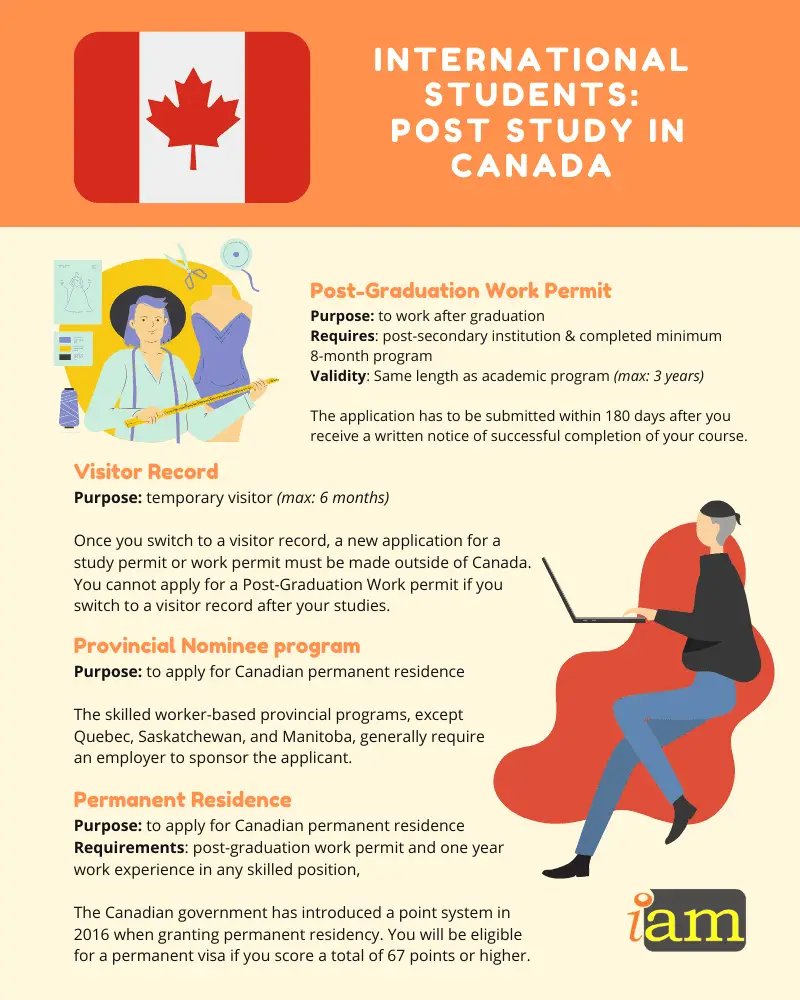
Provincial Nominee program
Through Provincial Nominee Programs (PNP), almost all of Canada’s ten provinces and three territories can nominate skilled worker candidates for admission to Canada with the specific skills required by their local economies. Successful candidates who receive a provincial or territorial nomination can then apply for Canadian permanent residence through federal immigration authorities.
The skilled worker-based provincial programs, except Quebec, Saskatchewan, and Manitoba, generally require an employer to sponsor the applicant. Without a government-approved employer sponsorship, the application will either not be approved, or will be routinely passed over in favour of applications with an employer-sponsored approval.
Permanent Residence
After getting a post-graduation work permit and you have work experience for one year in any skilled position, you are now eligible to apply for a permanent residence visa. The Canadian government has introduced a point system in 2016 when granting permanent residency. International students who completed a one-year or two-year full-time degree program are entitled to 15 points while students who took a full-time Masters or Doctoral program are entitled to 30 points. You will be eligible for a permanent visa if you score a total of 67 points or higher.
Canada's Post Study Work Visa Options
Canada's Post-Graduation Work Permit Program (PGWPP) allows students who have completed a program of study at eligible Canadian post-secondary institutions to obtain an open work permit. This permit enables you to gain valuable Canadian work experience, which is a critical component if you are seeking permanent residence through the Canadian Experience Class within Express Entry.
Updates and Considerations:
- Duration and Flexibility: The duration of the work permit under the PGWPP can be up to three years, depending on the length of the study program completed. Notably, the program offers flexibility, as it is not tied to a specific job or employer, allowing you to change employers and explore various employment opportunities across Canada.
- Application Process and Challenges: Graduates must apply for the PGWPP within 180 days of receiving confirmation (such as a transcript or an official letter) from your educational institution that you have met the requirements for completing your program of study. Meeting the eligibility criteria, including the completion of a full-time program of at least eight months, poses a challenge for some. Additionally, maintaining legal status in Canada throughout the application process is crucial.
- Success Rates and Strategies: The success rate for obtaining a post-graduation work permit is high for those who meet the eligibility criteria. However, to improve your chances, you should ensure that all documentation is complete and accurate, and consider consulting with immigration professionals, like IaM, if you have unique circumstances or require clarification on their eligibility.
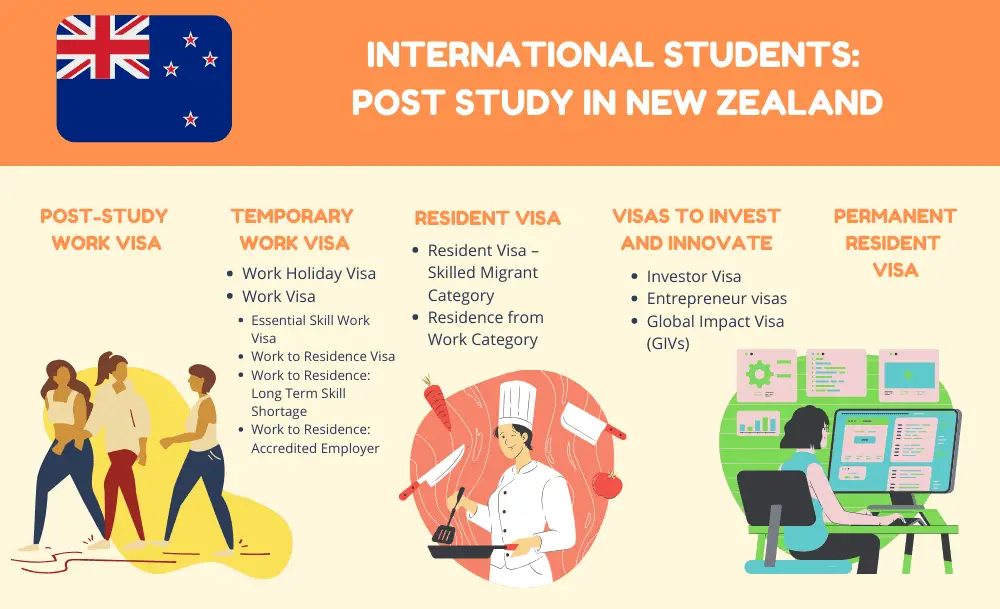
POST STUDY WORK VISA NEW ZEALAND
New Zealand has emerged as a prime destination for postgraduate students, thanks to its renowned education system and picturesque landscapes. The Post-study Work Visa in New Zealand offers a substantial opportunity for students to gain work experience in your field of study. This visa can last up to three years, depending on the level of your qualification and where you studied. Specifically, for those who complete a doctoral degree, the visa is available for three years, making it an attractive option for postgraduates aiming to enhance their career prospects.
Moreover, New Zealand's immigration policy encourages skilled migrants to settle in the country, with several pathways to residency for those who decide to pursue their careers post-graduation. The recent updates to the Skilled Migrant Category reflect New Zealand's commitment to attracting talent in sectors experiencing skill shortages, aligning with the interests of many postgraduates in fields like IT, engineering, and healthcare.
For postgraduates interested in research and academia, the New Zealand Research, Science and Innovation sector offers numerous opportunities for international students to contribute to cutting-edge research projects, often leading to further employment and residency options.
New Zealand Post-Study Work Visa
After you have completed your study program and achieved the New Zealand qualification, you can apply for a post study visa which will allow you to stay and work for 1 year up to 3 years. Your eligibility is dependent on a number of factors including length of study and level of study. If you studied outside Auckland, you may get a longer duration on your visa.
The New Zealand government has updated their policy for post-study work visa last 2018. The new policy has open work conditions which means you will be able to work for almost any employer in New Zealand and your visa won’t tie to you a specific job or location. If your work is listed on the country’s skill shortages, your chances of finding a job increases and you may be eligible to apply for a further work visa or residence visa.
You also have a choice to extend your post study visa if you further your studies and meet another set of qualifications:
- at least a Level 7 Bachelor’s degree
- lasted for a minimum of 30 weeks, and
- is higher than the qualification you submitted for your previous visa.
International students with partners
If you’re studying a Level 9 or 10 qualification, or a Level 7 or 8 qualification on the Long Term Skill Shortage List you can support your partner for a visitor or work visa. Your partner’s visa will be the same length of stay as your student visa. If you’re not studying one of these qualifications, your partner will need to apply for a visa in their own right.
After graduation, your residence status will be the same as your partner’s status if they do not apply for another visa with their own qualification.
Temporary Work Visa
Temporary visas allow you to live and work in New Zealand for a set period of time. You need a job or a job offer to qualify. Working temporarily can be used as a step towards gaining residence and settling in New Zealand permanently.

Working Holiday Visa
New Zealand has an agreement with several countries where anyone between 18 to 30 (or 35 for certain countries) can apply for a working holiday visa, which will allow you to work or travel in New Zealand for up to a year. If your purpose to stay in New Zealand is mainly for a holiday, with working being the secondary reason for your stay this will be a great option for you.
The agreement is different from each country like a limit to the number of people granted with the visa from the same country like Brazil. British and Canadian citizens can apply for a work holiday visa and be granted permission to live and work for up to 23 months while citizens from France, Japan and United States of America can be granted for up to 12 months.
Countries with a work holiday scheme with New Zealand:
Argentina
Austria
Belgium
Brazil
Canada
Chile
China
Croatia
Czech Republic
Denmark
Estonia
Finland
France
Germany
Hungary
Hong Kong
Ireland
Israel
Italy
Japan
Korea
Latvia
Lithuania
Luxembourg
Malaysia
Malta
Mexico
Netherlands
Norway
Peru
Philippines
Poland
Portugal
Singapore
Slovakia
Slovenia
Spain
Sweden
Taiwan
Thailand
Turkey
United Kingdom
USA
Uruguay
Vietnam
Work Visa
This visa is for people that work in a profession that is experiencing skill shortages or have a job offer from a New Zealand employer. Most work visas do not have an age limit. Under this umbrella there are several categories you may be eligible to apply.
Essential Skill Work Visa – If you have a job offer in an occupation is under the Shortage lists and your qualifications and experience match, you can apply for an Essential Skills work visa. This is intended to fill temporary skill gaps, so they do not lead directly to a residence application but if you have an Essential Skills work visa based on a skilled job, you may gain enough points to qualify for a residence visa under the Skilled Migrant Category.
Work to Residence Visa– This is a pathway to Residence after you have held the visa for 24 months. This visa is tied to a specific job in an area of skill shortage or with an accredited employer. You’ll be able to apply for residence if you continue working for your employer for two years. There are two main types of Work to Residence Visa:
- Work to Residence: Long Term Skill Shortage – If you have a permanent or long-term job offer in an occupation on the Long Term Skill Shortage List and your qualifications and experience match, you could apply for a Work to Residence Visa. You’ll need to meet the age, health, and character requirements.
- Work to Residence: Accredited Employer – If you have a long-term or permanent job offer from an Immigration New Zealand accredited employer you could apply for a work to residence visa. You’ll need to meet the age, health, and character requirements, and your job offer will need to meet certain requirements.
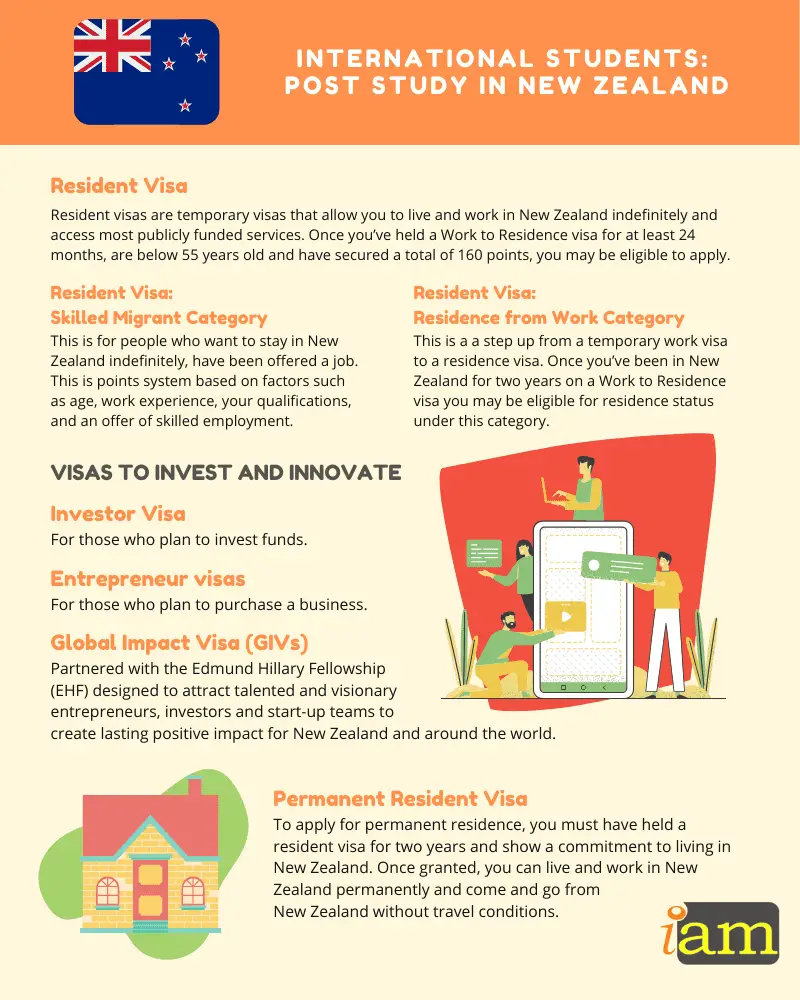
Resident Visa
A resident visa is a temporary visa that generally allows you to live and work in New Zealand indefinitely and access most publicly funded services. Once you’ve held a Work to Residence visa for at least 24 months, are below 55 years old and has secured a total of 160 points then you may be eligible to apply. Resident visas have travel conditions that only allow a person to re-enter New Zealand as a resident until a certain date.
Resident Visa – Skilled Migrant Category
This is for people who want to stay in New Zealand indefinitely, have been offered a job and have the skills, qualifications and experience the countty needs. This is points system based on factors such as age, work experience, your qualifications, and an offer of skilled employment. You must also be aged 55 or under, and meet English language, health, and character requirements.
Residence from Work Category
This category is a step up from a temporary work visa to a residence visa. Once you’ve been in New Zealand for two years on a Work to Residence visa you may be eligible for residence status under this category.
Visas to invest and innovate
If you have capital and the right skills the New Zealand government offers several channels and a unique opportunity to enjoy New Zealand’s wide-open spaces and world-beating lifestyle while developing your business interests.
- Investor Visa – If you plan to invest funds, you can apply for residence under our Investor categories.
- Entrepreneur visas – If you plan to purchase or establish a business.
- Global Impact Visa (GIVs) – The government has partnered with the Edmund Hillary Fellowship (EHF) to deliver this world-first innovative new visa, designed to attract talented and visionary entrepreneurs, investors and start-up teams with the drive and capabilities to create lasting positive impact for New Zealand and around the world.
Permanent Resident Visa
In order to apply for permanent residence, you must have held a resident visa for two years and can show a commitment to living in New Zealand. Once granted, you can live and work in New Zealand permanently and come and go from New Zealand without travel conditions.
New Zealand's Post Study Work Visa Options
New Zealand offers the Post-Study Work Visa as a pathway for international students to gain work experience after completing their studies in New Zealand. This visa aims to retain skilled graduates and provide a bridge to permanent residency by allowing you to work for any employer and in almost any job.
Updates and Considerations:
- Visa Duration and Conditions: The Post-Study Work Visa is typically valid for one, two, or three years, depending on the level of your qualification and where you studied. For example, if you completed a qualification in Auckland (unless it is a doctoral degree) you will receive a shorter visa compared to another student who studied outside Auckland, promoting regional development and employment.
- Application Process and Challenges: You must apply for the Post-Study Work Visa within three months (or six months if you hold a student visa) after the end date of your student visa. One of the challenges is proving the relevance of the qualification to the job, as this can affect the success of your future residency applications. Additionally, navigating the job market and securing employment that aligns with your qualifications can be daunting for new graduates.
- Success Rates and Strategies: To enhance the success rate of obtaining a Post-Study Work Visa and subsequently transitioning to more permanent visa options, graduates should focus on gaining employment that is relevant to your field of study. Networking, understanding the New Zealand job market, and potentially engaging with career services and immigration advisors can significantly improve your employment prospects and visa application outcomes.
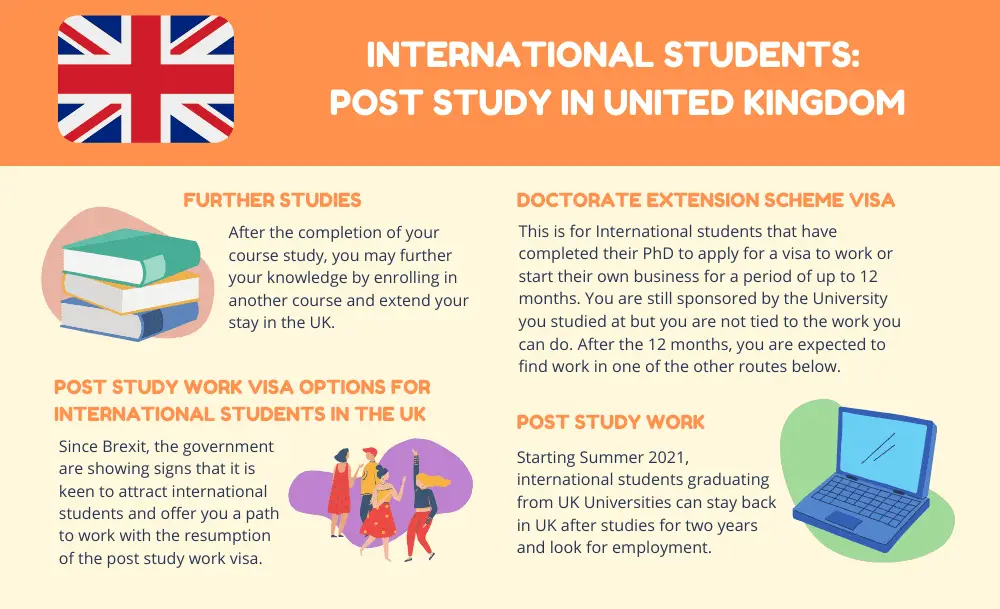
POST STUDY WORK VISA UK
In the UK, you have a number of options after your finish your studies. But beware, due to recent changes, most of the straight-forward routes to extend or “switch” require you to have successfully completed your course of studies you were previously on.
The UK changed to a points-based system and initially had a number of routes. One of which was called the PSW (Post Study Worker) visa. That was halted for a number of years and made the UK an unattractive destination for students. It was then brought back again and the PSW is now called the Graduate route.
For now, tyhe UK continues to be a leading destination for postgraduate students seeking high-quality education and valuable work experience post-study.
Further Studies
After the completion of your course study, you might consider furthering your knowledge by enrolling in another course and extending your stay in the UK.
Post study work visa options for international students in the UK
The UK is undoubtedly one of the harder countries to find work in after studies and the options to do so are restricted. But since Brexit, the government is showing signs that it is keen to attract international students and offer you a path to work with the resumption of the post-study work visa.
Doctorate Extension Scheme Visa – the Graduate Route for Doctoral Students
This little known route is for international students that have completed their PhD to apply for a visa to work or start your own business for a period of an additional 12 months to the standard Graduate Route visa (a total of three years). Technically, you are still sponsored by the University you studied at, but you are not tied to the work you can do. After three years, you are expected to find work in one of the other routes below.
Graduate Route – the UK Post Study Work Visa
Since 2012 the UK government has allowed international students to stay in the UK for four months after completing their studies, however this was updated to six months as of 2019. Starting Summer 2021, international students graduating from UK Universities can stay back in UK after studies for two years and look for employment.
The re-introduction of the Graduate Route visa allows international students who have completed a degree at the undergraduate level or above at a UK Higher Education Provider, to stay in the UK for two years (three years for doctoral students) after their studies, working at any skill level, and looking for work. This route does not require a sponsor, offering flexibility and a pathway to potential settlement in the UK for talented graduates. It's crucial for applicants to stay informed about changes to this route and to prepare their application well in advance of their course completion.
READY TO START?
START YOUR GRADUATE ROUTE VISA APPLICATION
Get help and support from our Immigration lawyers
Skilled Worker Visa (previous Tier 2 UK Visa)
This is one of the most common UK visas that most students choose to switch from a Tier 4 student visa. In order to qualify for this UK work permit visa, you are required to find a job with an employer who is willing to sponsor and offer you a minimum salary annually.
Tier 5 UK Visa
The Tier 5 visa allows entry to work in the UK in a number of different circumstances, such as for charity workers, entertainers, diplomatic staff, and sportspeople. Depending on the scheme you are applying for, this UK work visa is a validation to stay back and work in UK for 12 to 24 months, provided to you by UK immigration.
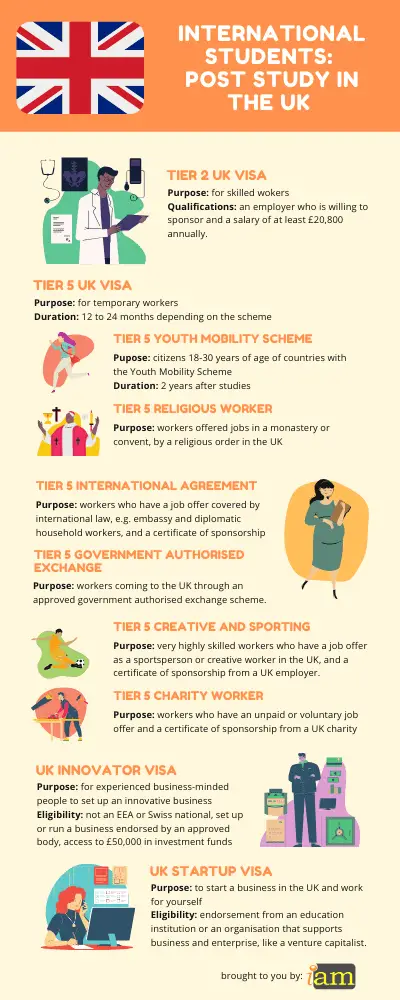
Tier 5 Youth Mobility Scheme for UK Visa
If you are a citizen of some specific countries, UK immigration will allow you to work in UK for two years after your studies. The list of countries on UK immigration website for Tier 5 UK work visa Youth Mobility Scheme:
Australia
Canada
Hong Kong
Japan
Monaco
New Zealand
Republic of Korea
Taiwan
You need to be between 18 to 30 years of age and need 1,890 GBP to apply.
Tier 5 UK Visa for Temporary Worker – Religious Worker
For workers offered a job such as preaching or work in a monastery or convent, by a religious order in the UK.
Tier 5 UK Visa for Temporary Worker – International Agreement
For workers who have a job offer that is covered by international law, such as embassy and diplomatic household workers, and a certificate of sponsorship from an organisation with a valid Tier 5 sponsorship license. This includes workers under the General Agreement on Trade in Services (GATS) and similar agreements.
Tier 5 UK Visa Temporary Worker – Government Authorised Exchange
For workers coming to the UK through an approved government authorised exchange scheme. This visa allows the worker to do work experience, training, academic research or a fellowship, and to take part in an Overseas Government Language Programme.
Tier 5 UK Visa Temporary Worker – Creative and Sporting
For very highly skilled workers who have a job offer as a sportsperson or creative worker in the UK, and a certificate of sponsorship from a UK employer with a valid Tier 5 sponsorship license. Sportspeople on this visa must be internationally established at the highest level in their sport, and/or their job must make a significant contribution to the development and running of sport at the highest level.
Tier 5 UK Visa Temporary Worker – Charity Worker
For workers who have an unpaid/voluntary job offer and a certificate of sponsorship from a UK charity with a valid Tier 5 sponsorship license. The job taken must be directly related to the sponsor charity's work.
UK Innovator Visa
This has replaced the Tier 1 Entrepreneur Visa category. This visa is usually for experienced business-minded people to set up an innovative business. This category may lead to settlement in the UK. You are eligible for this visa if you meet the following criteria:
- You are not a national of the European Economic Area (EEA) and Switzerland.
- You want to set up or run a business and must be endorsed by an approved body
- You must have access to £50,000 (reduced from the £200,000 usually needed for a UK Tier 1 Entrepreneur Visa) in investment funds. If you already have a business established in Britain and you have been endorsed for an existing UK visa, no minimum investment funds are required.
After five years, you could be eligible to apply for indefinite leave to remain (ILR).
UK Start-Up Visa
This is the replacement for the old Tier 1 Entrepreneur visa. A start-up visa allows you to start a business in the UK and work for yourself . You will need to be endorsed by an education institution or an organisation that supports business and enterprise, like a venture capitalist.
The UK's Post Study Work Visa Options
The UK's approach to international graduates has evolved, notably with the Graduate Route. This visa allows students who have completed an eligible UK degree to stay in the country for two years (three years for PhD graduates) to work or look for work at any skill level, and with any employer. This route does not require sponsorship, giving graduates flexibility in their job search and career development.
Application Process:
You must have a valid Tier 4 or Student visa at the time of application and have completed a degree at undergraduate level or above at a UK Higher Education Provider with a track record of compliance. The application is straightforward and can be completed online, including the payment of the visa fee and the Immigration Health Surcharge. But you want to make sure you get it right.
Potential Challenges:
One of the main challenges for applicants is ensuring you apply within the UK before your student visa expires. Additionally, you need to have successfully completed your course, which is verified through the Confirmation of Acceptance for Studies (CAS) used for your Student visa application. Timing and compliance with these requirements are critical to avoid application refusal.
Success Rates and Strategies:
The success rate for the Graduate Route is relatively high for those who meet the eligibility criteria. To improve your chances of success, you should:
- Ensure you have all the necessary documentation in order, including proof of your qualification and your current visa status.
- Apply in good time before your current visa expires.
- Seek advice from IaM or your educational institution's immigration advice service if you are unsure about any aspect of the application process.
Recent Updates:
The UK government has also introduced the High Potential Individual (HPI) visa, targeting recent graduates from top global universities outside the UK to come to the UK to work, or look for work, without a job offer. This route opens up opportunities for a broader range of talented graduates to contribute to the UK's workforce.
READY TO START?
START YOUR GRADUATE ROUTE VISA APPLICATION
Get help and support from our Immigration lawyers
POST STUDY WORK VISA AMERICA
The United States offers the Optional Practical Training (OPT) program for postgraduates, allowing them to gain practical experience in their field of study. Students can apply for up to 12 months of OPT, with those in STEM fields eligible for a 24-month extension. Understanding the eligibility requirements and application timelines is essential for maximising this opportunity. The competitiveness of the H-1B visa program also underscores the importance of strategic planning for postgraduates wishing to transition from student visas to work visas.
Graduate School
After completing your undergraduate education in the United States, you might consider attending a graduate school. The United States is well known for its wide choice of educational opportunities.
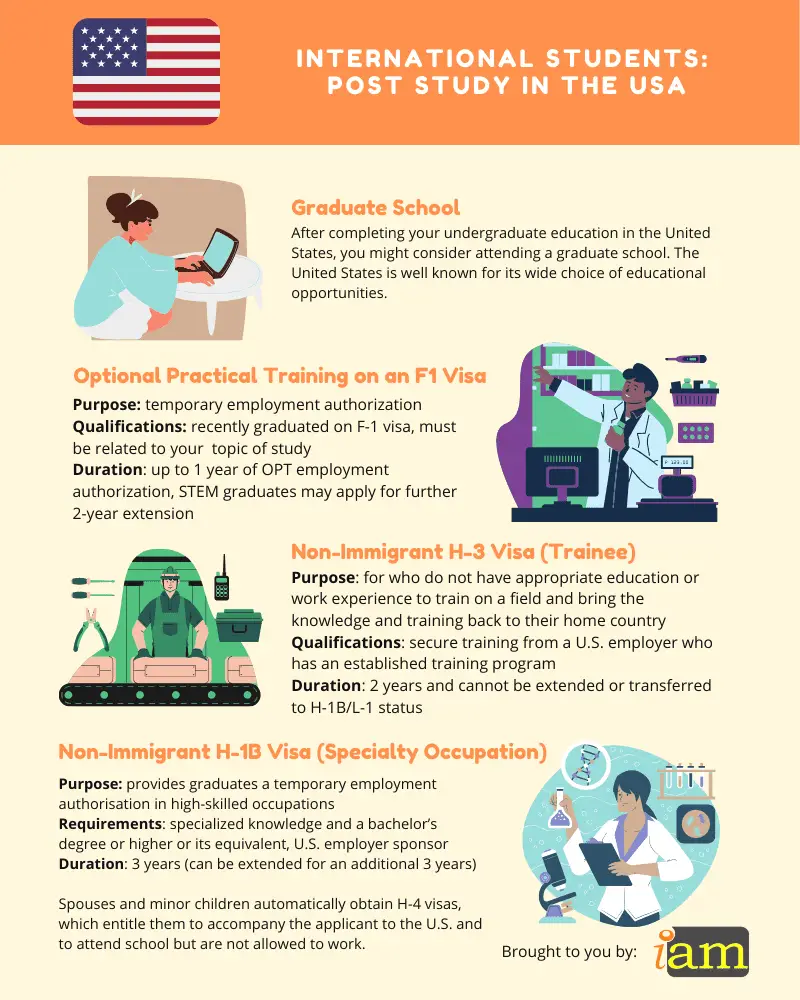
Optional Practical Training (OPT) on an F1 Visa
An option for recently graduated F-1 visa students. This is a temporary employment authorization and must be related to your F-1 topic of study. Graduates may apply to receive up to one year of OPT employment authorization. If you studied a Science, Technology, Engineering, and Math (STEM) field, you may also apply for a two-year extension of your OPT for a total of three years. An F1 visa student is generally entitled up to one year of post-completion practical training.
Non-Immigrant H-3 Visa (Trainee)
This visa is suited to those individuals who do not have the appropriate education or work experience. It is ideal for those who would like to come to the U.S. to train in a particular field with the intention of transporting the knowledge and training back to their home country upon completion of their visa. The H-3 visa is valid for 2 years and cannot be extended or transferred to H-1B/L-1 status. To qualify for an H-3 visa, the applicant needs to secure training from a U.S. employer who has an established training program.
Non-Immigrant H-1B Visa (Specialty Occupation)
This visa provides graduates with temporary employment authorisation in high-skilled occupations. H-1B applicants are required to have specialised knowledge and a bachelor’s degree or higher or its equivalent. The H-1B is granted for an initial period of 3 years and can be extended for an additional 3 years but cannot be extended beyond 6 years.
Spouses and minor children automatically obtain H-4 visas, which entitle them to accompany the applicant to the U.S. and to attend school but are not allowed to work.
You qualify for this visa if you meet the minimum requirements.
- A U.S. employer to sponsor the applicant
- a U.S. Bachelors Degree or its equivalent
- a correlation between the job duties and the applicant’s education and work experience.
In addition to the above requirements, it is also necessary to obtain approval of a Labor Condition Attestation (LCA) from the Department of Labor prior to filing the H-1B petition with the Immigration & Naturalization Service. LCA is required to ensure that foreign workers are not exploited by U.S. employers and are paid the same salaries and obtain the same benefits as their American counterparts.
Non-Immigrant E-1/E-2 Visa (Treaty Trader/Treaty Investor)
Certain countries have entered into treaties with the United States, which allows their nationals to obtain treaty trader/treaty investor visas. A fundamental requirement for an E-1 visa is that at least 51% of the company’s trade must be between the U.S. and the treaty country.
An E-2 visa requires a “substantial investment” to be made into a new or existing enterprise. Managers, executives, and other essential employees are eligible for these visas. The visa is usually granted for a 5-year period with 2-year increments upon each entry. It is possible to extend these visas as long as there is a need for the individual to direct and control the U.S. enterprise and the concern remains viable.
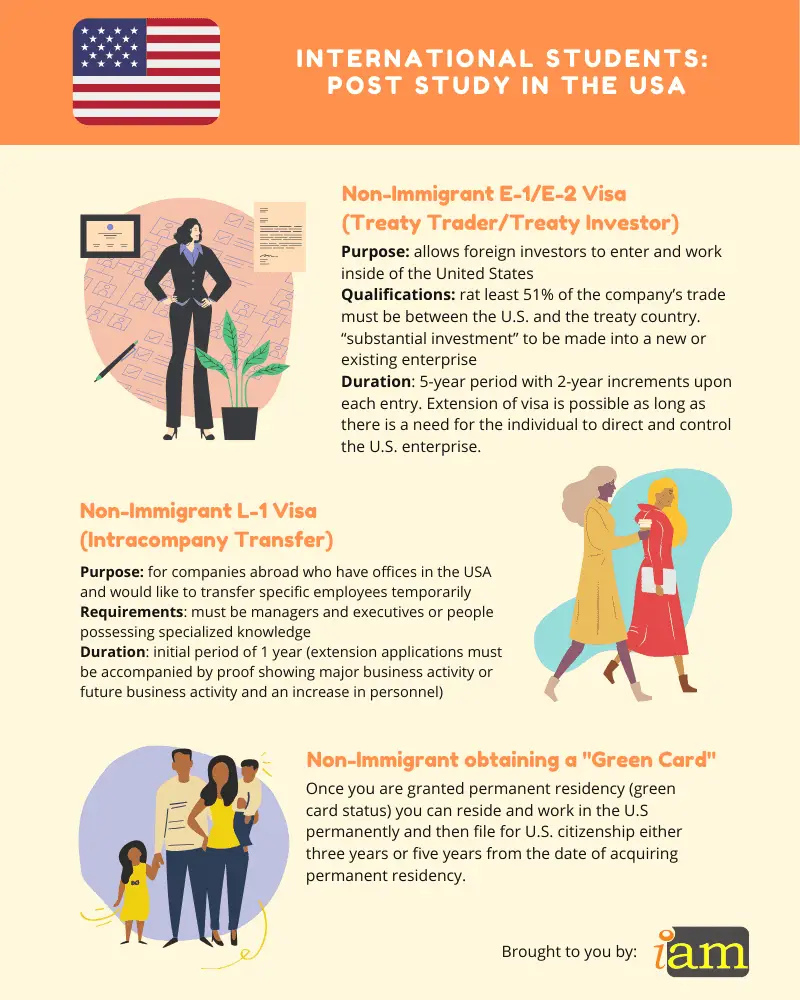
Non-Immigrant L-1 Visa (Intracompany Transfer)
This visa is used for companies abroad who have offices in the United States and would like to transfer specific employees here on temporary employment assignments. This visa is designed for managers and executives or people possessing specialized knowledge. You will be eligible to apply for permanent residency through this category.
If the U.S. subsidiary is a newly established office, the applicant will only be admitted for an initial period of 1 year. It is possible to apply for extensions, which must be accompanied by documentation showing major business activity or future business activity and an increase in personnel.
Non-Immigrant Obtaining a “Green Card”
Once you are granted permanent residency or green card status you will be able to reside and work in the U.S permanently. Depending on their classification, an immigrant may be eligible to file for U.S. citizenship either three years or five years from the date of acquiring permanent residency.
There are four main categories under which it is possible to acquire permanent residency status in the U.S. The easiest and quickest way is through a family relationship where the petitioner is either a U.S. citizen or a permanent resident. The other categories involve employment sponsorship, diversity immigrants and refugees and asylees.
United States Post Study Work Visa Options
The United States provides two primary pathways for postgraduates to gain work experience: the Optional Practical Training (OPT) program and the H-1B visa. These routes are integral for international students aiming to apply their academic knowledge in a practical work environment within the U.S.
Updates and Considerations:
- Optional Practical Training (OPT): The OPT program allows international students on F-1 visas to work up to 12 months in their field of study, with an extension of 24 additional months for STEM (Science, Technology, Engineering, and Mathematics) graduates. The application process for OPT requires careful timing; you can apply up to 90 days before completing your studies and up to 60 days after. One challenge is the precise timing of the application to ensure it aligns with your job offers and employment start dates.
- H-1B Visa: The H-1B visa program is for speciality occupations requiring theoretical or technical expertise. A significant challenge is the annual cap, with 85,000 visas available each fiscal year, including 20,000 reserved for applicants with a U.S. master's degree or higher. The demand often exceeds the cap, leading to a lottery system. To improve your chances, it's advisable to have a solid petition prepared by the employer and to consider applying under the U.S. master's cap if eligible.
Strategies for Success:
For OPT, engaging with the university's career services early and seeking internships during study can enhance your employability upon graduation. For H-1B visa hopefuls, finding an employer willing to sponsor the visa and navigating the application process with the help of an immigration lawyer can increase success rates.
Success Rates and Insights:
The success rate for OPT applications is relatively high for students who meet all requirements and deadlines. However, the H-1B visa's competitive nature and cap mean not all applicants will secure a visa through the lottery system. If you are not selected, exploring alternative visas such as the O-1 visa for individuals with extraordinary abilities or the L-1 visa for intra-company transfers may be viable options.
POST STUDY WORK VISAS ELSEWHERE
If you want to know your post-study options elsewhere, be sure to check out our other articles below.
Post Study in Europe
In Cyprus, the post study work visa provides a unique opportunity for graduates to immerse themselves in the Mediterranean lifestyle while gaining valuable work experience. Understanding the post study work visa in Cyprus requirements will ensure a smooth transition from student to working professional.
France's post-study work visa, known as the “APS” (Autorisation Provisoire de Séjour), allows international students who have completed a master's degree or higher from a French institution to stay for a year to seek employment or create a business within France. One challenge is the competitive job market, particularly for those lacking fluency in French. However, sectors like technology, engineering, and business often have opportunities for English speakers.
Germany offers a unique opportunity for postgraduates through its Job Seeker Visa, allowing recent graduates from German universities to stay in the country for up to 18 months to seek employment. Additionally, the EU Blue Card provides a clear path for highly skilled non-EU graduates to stay and work in Germany, requiring a job offer with a minimum salary threshold. Understanding the nuances of these options, including the benefits of pursuing vocational training or internships, can greatly benefit postgraduates aiming to integrate into the German job market.
Ireland provides a Third Level Graduate Scheme, allowing non-EU/EEA students who have graduated from Irish higher education institutions to remain in Ireland for 24 months to seek employment. Like other countries, a challenge is securing employment within this timeframe, particularly in a competitive job market. However, Ireland's booming tech, finance, and pharmaceutical sectors offer numerous opportunities for skilled graduates.
The Netherlands offers a “zoekjaar” visa, or “orientation year” visa, which allows recent graduates from Dutch universities or top-ranked global universities to spend a year seeking employment or starting a business. The challenge is the highly competitive Dutch job market, but the country's openness to international talent and English-speaking work environment in many sectors helps mitigate this.
Sweden grants international students who have completed higher education from Swedish institutions the right to apply for a 12-month extension of their residence permit to look for work or start a business. The primary challenge here is the highly competitive nature of the Swedish job market, alongside the need for proficiency in the Swedish language for certain roles. Nonetheless, Sweden's innovation-driven economy offers good prospects in technology, engineering, and design fields.
Post Study in Asia
🇵🇭 Philippines
🇰🇷 South Korea
Japan offers a distinct avenue for graduates aiming to explore work opportunities in Asia. The Japan post study work visa is designed for students who wish to extend their stay and find employment in Japan, emphasising the country's commitment to international talent.
As you consider extending your stay after graduation, the Malaysia graduate visa, officially known as the Malaysia post study work visa, offers a pathway to employment for international students. This visa not only allows graduates to seek job opportunities within Malaysia but also to experience the country's dynamic work culture firsthand.
Post Study in the Americas
Post Study in Other Countries
Post-Study Work (PSW) Visas in Other Countries
While the United Kingdom, Australia, Canada, New Zealand and the United States are popular destinations for international students seeking Post-Study Work (PSW) opportunities, several other countries also offer compelling PSW visa options. These countries have recognised the importance of retaining skilled graduates to bolster their workforce and innovation landscapes.
Success Strategies:
- Early Preparation: Start gathering documents and understanding visa requirements well before completing your studies.
- Compliance: Ensure compliance with all visa conditions during your studies, as this will be critical when applying for a PSW visa.
- Employability Skills: Engage in activities that enhance your employability, such as internships, part-time work related to your field of study, and networking events.
- Consultation: Consider consulting with an immigration adviser or lawyer for personalised advice and to ensure your application is as strong as possible.
- Language Skills: In non-English-speaking countries, proficiency in the local language can significantly improve job prospects.
- Networking: Engaging with local professional networks and university alumni can provide valuable job leads and advice.
- Cultural Adaptation: Understanding and adapting to the local job search etiquette and work culture can enhance your chances of securing employment.
- Skill Alignment: Focusing on sectors with high demand for skilled workers can increase the likelihood of post-study employment.
In today's global economy, understanding your post study work visa options is more important than ever. Whether you're interested in the advantages of a graduate visa or the specifics of extending a graduate visa in the UK, staying informed will help you make the most of your international education. Remember, each post study work permit offers a unique set of opportunities and challenges, tailored to the economic and cultural landscape of the host country.
If you are looking to leverage your international education into a meaningful career opportunity, understanding the specific post-study work visa options and requirements in each country is crucial. From the Graduate Route in the UK to the PGWPP in Canada, each country offers unique pathways that can significantly impact a graduate's career trajectory and long-term residency plans. Staying informed and strategically planning the transition from student to working professional is essential for maximising the benefits of an international education.
What are your thoughts on these Post Study Options? Is there anything we missed or anything you need clarification on? Comment below.
IaM can help with your visa application to the United States, the UK & other countries
If you need help with a US visa, a UK Visa, or visa to Europe, including help with appointment booking obligations, IaM can help. For more information and advice on US immigration, UK immigration law and US visa applications or if you need any help or assistance please, reach out to your Visa Coordinator at IaM.
Secure Your Future Now: Exclusive PSW Visa Insider Secrets!
Grab your seat on our FREE Insider's Guide to effortlessly securing your PSW visa, anywhere in the world. Exclusive to email insiders, this is your fast track to a post-study career abroad. Act now—your global future awaits!
Unlock the door to your post-study career with our FREE Insider's Guide to Navigating Post Study Work Visas – a privilege reserved for the ambitious few. We're revealing proven strategies, insider tips, and the roadmap that has transformed the dreams of countless international students into reality.
But here's the catch – our expert team can only take on 5 new applicants each month, ensuring personalised, top-tier service. Don't miss your shot at success; spots fill up fast! Guaranteed, this is your golden ticket to not just applying, but thriving post-study. Exclusive access is just a click away, but only available to our email insiders. Act now or risk waiting months for another chance. Your future as a post student is too important to leave to chance. Opt-in to win your spot and start the journey to securing your PSW visa today!
- Simpler Travel in Sight: Europe Discusses New Tourist Visa - 20 July 2025
- EU Eases Schengen Visa Rules for Turkish Citizens - 19 July 2025
- Visiting the US Just Got Pricier: New Visa Fee Explained - 18 July 2025








 Latvia
Latvia
















